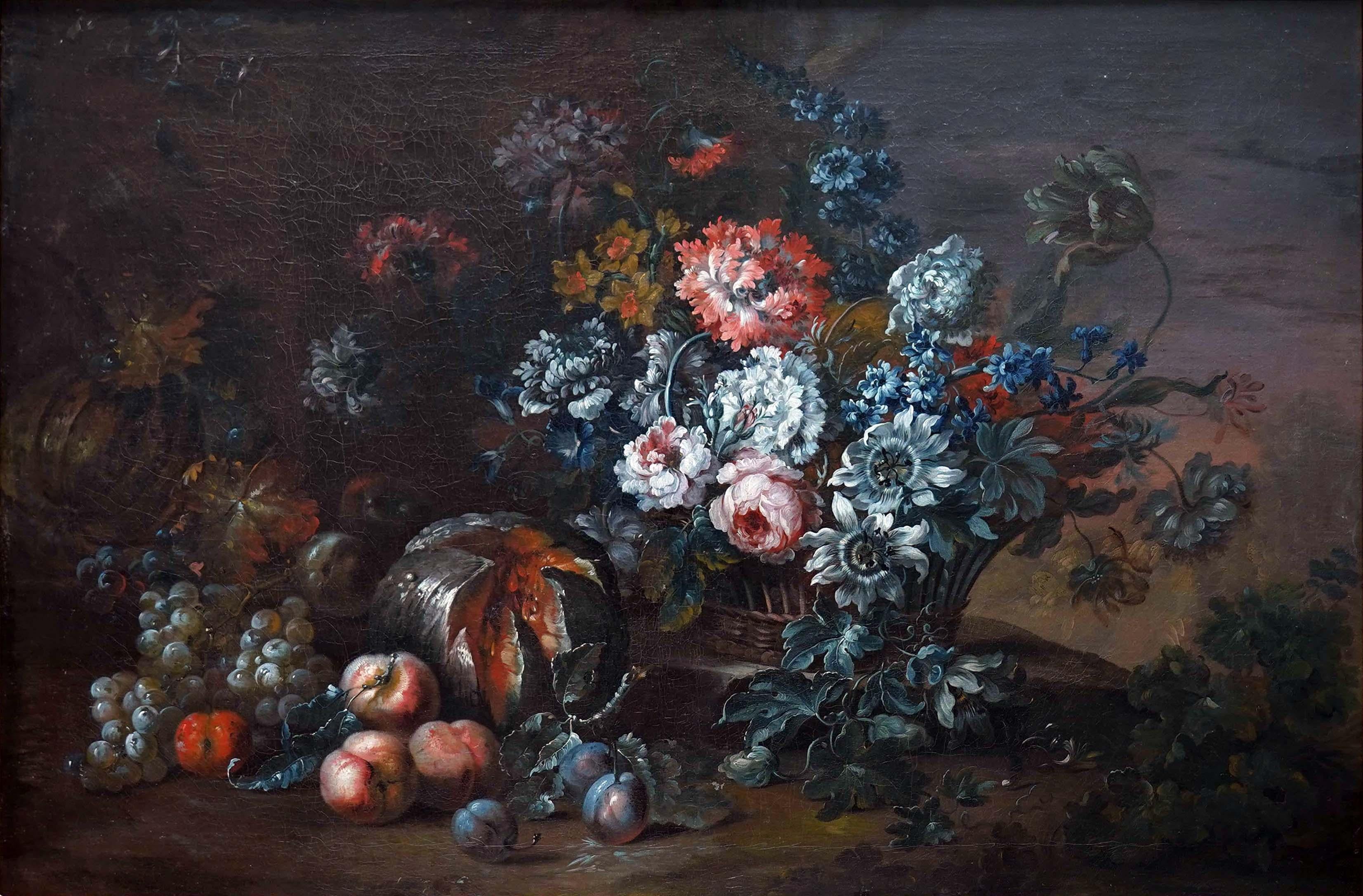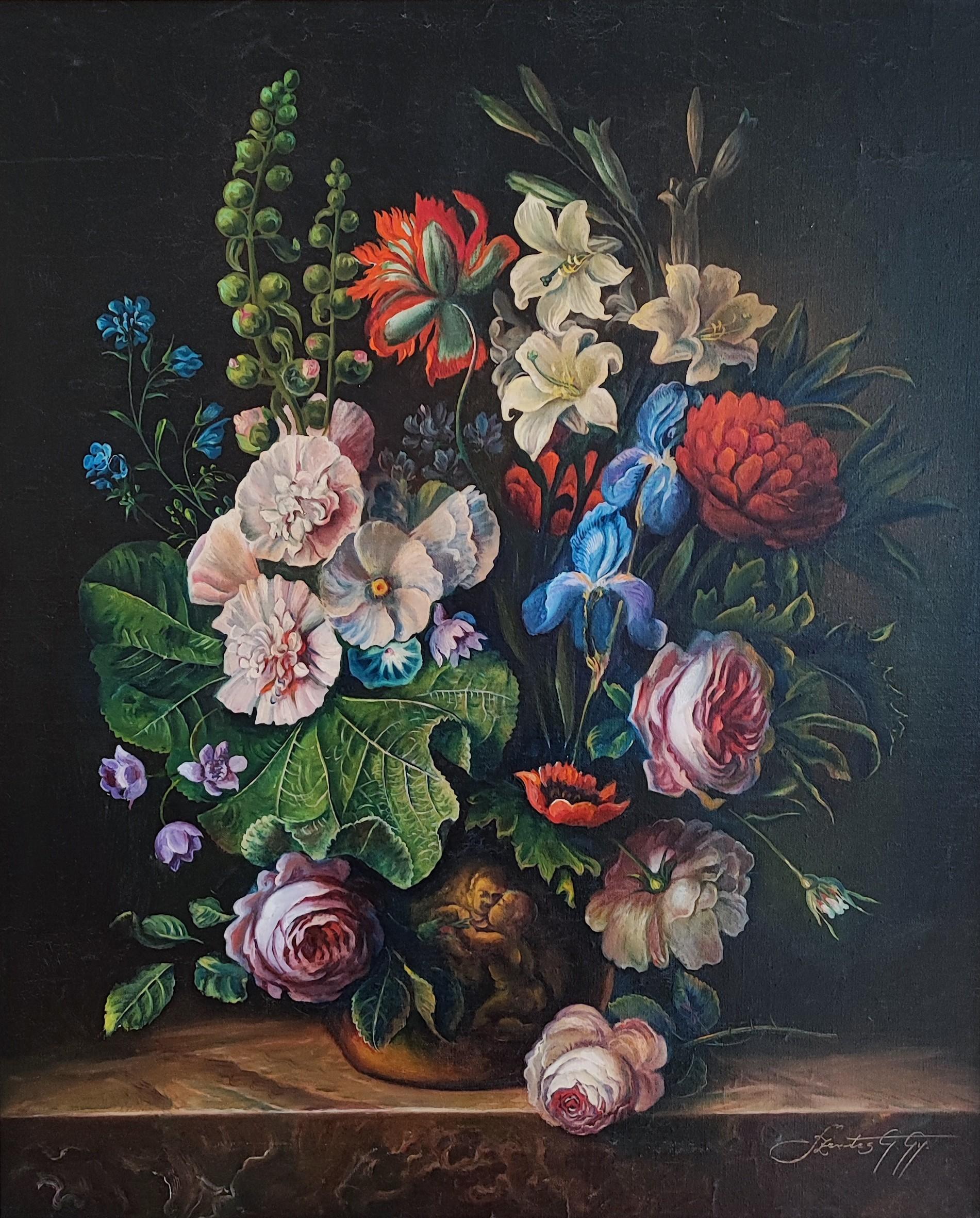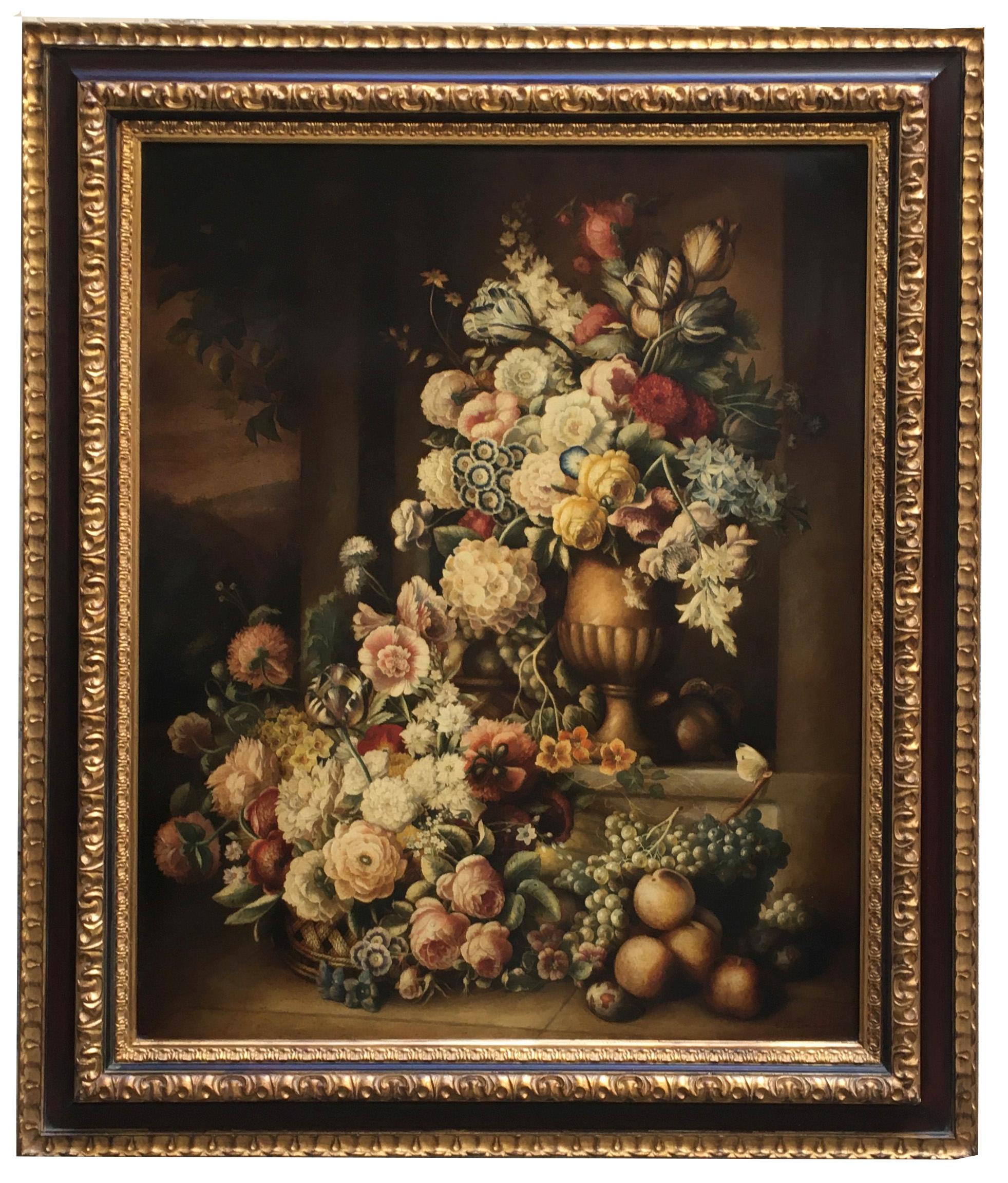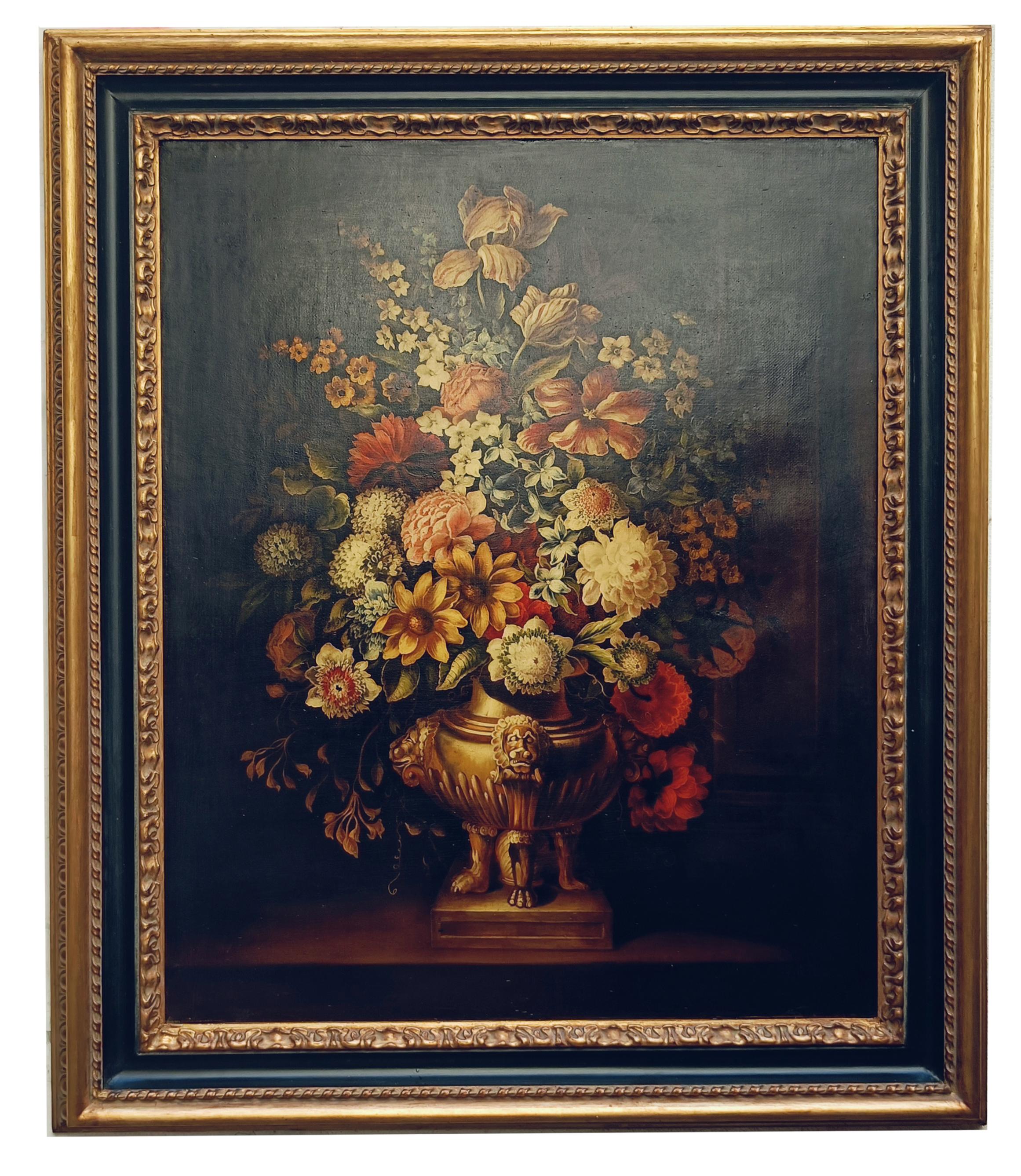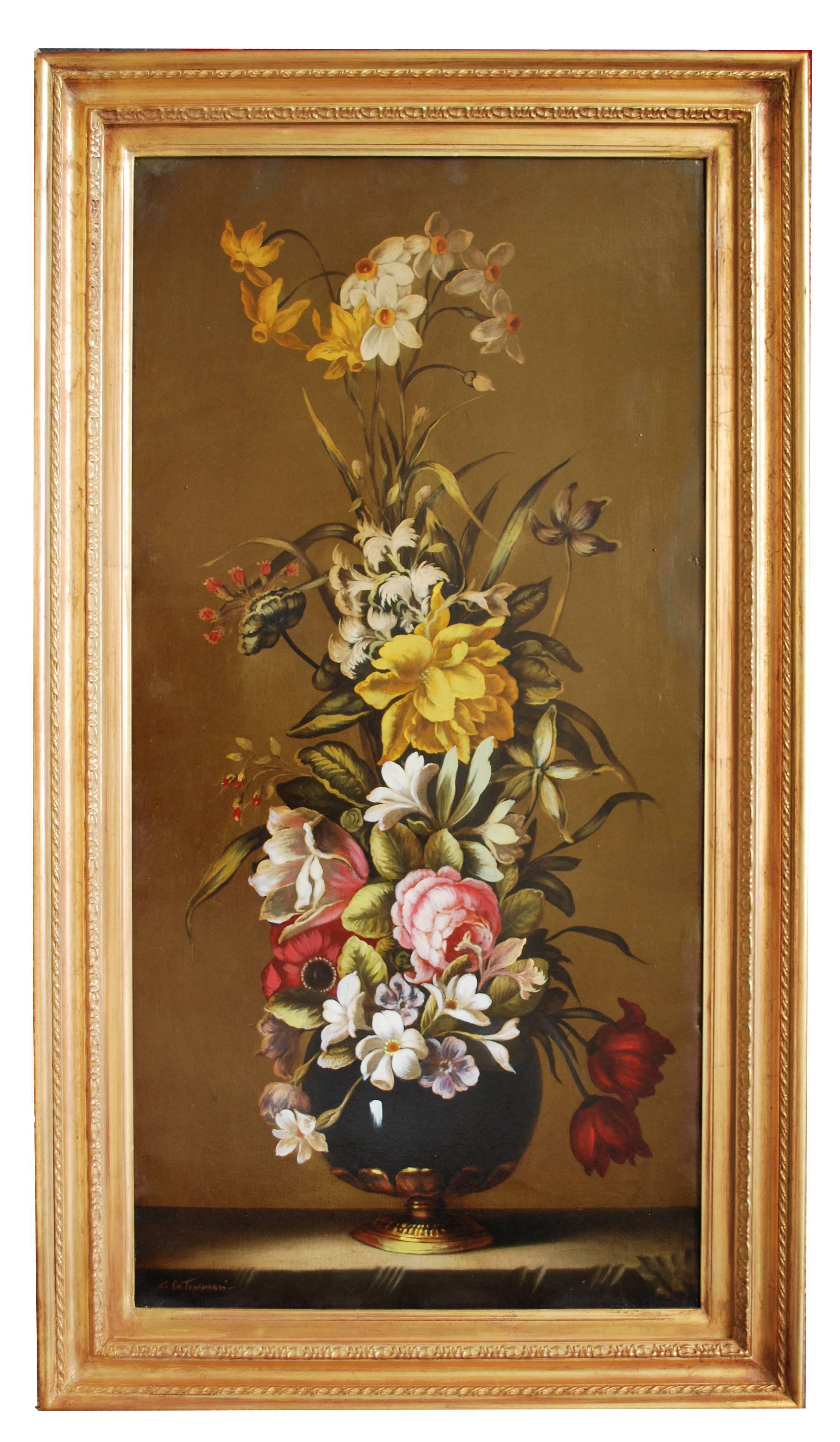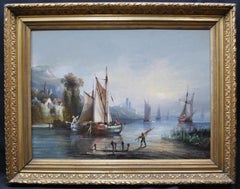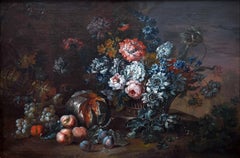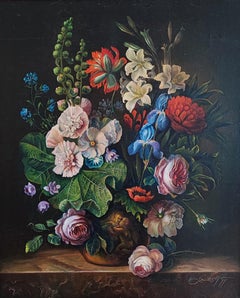Items Similar to Pair of flower still lifes on copper, Flanders, 17th century, tulip
Want more images or videos?
Request additional images or videos from the seller
1 of 21
UnknownPair of flower still lifes on copper, Flanders, 17th century, tulip
About the Item
Pair of flower still lifes with various flowers (including a tulip) in a basket, oil on copper
Flemisch school, second half 17th century.
Dimensions excl. frame: 17 x 22 cm.
Dimensions incl. frame: 23 x 28 cm.
Still-life painting as an independent genre or specialty first flourished in the Netherlands during the early 1600s, although German and French painters (for example, Georg Flegel and Sebastian Stoskopff; 21.152.1, 2002.68) were also early participants in the development, and less continuous traditions of Italian and Spanish still-life painting date from the same period. Still-life motifs occur fairly frequently in manuscripts, books of hours, and panel paintings of the 1400s and 1500s, such as Robert Campin’s Annunciation Triptych (56.70) of about 1425, and in Petrus Christus‘ Goldsmith in his Shop of 1449 (1975.1.110). Many of the objects depicted in these early works are symbolic of some quality of the Virgin or another religious figure (for example, the lily stands for purity), while other objects may remind the viewer of an edifying concept such as worldly vanity or temperance (as in the case of the goldsmith’s mirror and scales). Moralizing meanings are also common in independent still-life paintings of the seventeenth century, which range from such obviously didactic works as Jacques de Gheyn II’s Vanitas Still Life of 1603 (1974.1) and Pieter Claesz’s Still Life with a Skull and a Writing Quill of 1628 (49.107) to rich displays of luxury items like Abraham van Beyeren’s Still Life with Lobster and Fruit of the 1650s (1971.254). In the latter work, the pocket watch, which symbolizes the fleeting nature of earthly pleasures, may be considered more of an intellectual conceit than a sober warning against the desire for material things like the objects depicted or the painting itself.
In general, the rise of still-life painting in the Northern and Spanish Netherlands (mainly in the cities of Antwerp, Middelburg, Haarlem, Leiden, and Utrecht) reflects the increasing urbanization of Dutch and Flemish society, which brought with it an emphasis on the home and personal possessions, commerce, trade, learning—all the aspects and diversions of everyday life. Floral still lifes were especially prominent in the early 1600s, and in their highly refined execution and in their subjects and symbolism were addressed to a cultivated audience. Painters such as Ambrosius Bosschaert the Elder, Balthasar van der Ast, Roelandt Savery, and Jacob Vosmaer often referred to herbals and other botanical texts when composing “bouquets” (like Vosmaer’s A Vase of Flowers; 71.5), which typically combined flowers from different countries and even different continents in one vase and at one moment of blooming. For many courtly collectors (for example, Emperor Rudolf II in Prague) and wealthy merchants, a flower picture was part of a private domain that included a garden with rare specimens (which occasionally cost more than paintings of them), colored drawings or watercolors of rare tulips and other unusual flowers, and a small library of botanical books and prints.
While floral still lifes were especially popular in Antwerp (Jan Brueghel the Elder and Younger were among the main practitioners; 67.187.58), Middelburg, and the court city of The Hague, the so-called monochrome “banquet” or “breakfast” still life was more common in the mercantile city of Haarlem; Floris van Dyck, Pieter Claesz, Willem Claesz Heda, and others arranged familiar foods (ham, cheese, oysters, and so on) and glasses of wine or beer on wooden tabletops. Vanitas still lifes were a specialty of Leiden artists such as the young Jan Davidsz de Heem and David Bailly. Large “market” and “kitchen” still lifes, which often include figures, were first popularized during the mid-1500s in Antwerp by Pieter Aertsen and his pupil Joachim Beuckelaer. Aertsen returned to his native Amsterdam in about 1557 and inspired Dutch painters such as Joachim and Peter Wtewael to paint similar works. The younger Wtewael’s Kitchen Scene adopts the sexual innuendo of Aertsen’s carnal motifs but misses his understatement.
In the 1650s and 1660s, when Amsterdam became the social, political, and financial capital of the Netherlands, still-life painters such as Van Beyeren and Willem Kalf (1971.254; 53.111) produced fancy pronk (display) still lifes featuring imported fruits and expensive objects such as Chinese porcelain, Venetian glassware, and silver-gilt cups and trays, usually rendered in glistening light and a velvety atmosphere. In these works and later flower pictures by De Heem, Willem van Aelst, Rachel Ruysch, and the highly influential Jan van Huysum, the emphasis upon aesthetic appeal and decorative function evident in almost all still-life painting is more conspicuous than ever before. It was also in the second half of the 1600s that still lifes of dead game, or “hunting trophies” (like Jan Weenix’s Falconer’s Bag of 1695; 50.55), created an aristocratic image of country life (which is found also in pictures of live birds and animals, like Melchior d’Hondecoeter’s Peacocks of 1683; 27.250.1). In earlier decades, pictures of dead game had been more at home in the Spanish Netherlands, where Frans Snyders and his follower Jan Fyt (71.45) turned images of unfortunate fowl, hares, deer, and other animals into essays in color and texture, and into testaments of life lived comfortably on sprawling estates. By 1700, Dutch, Flemish, German, and French specialties had become less clearly distinguishable, with Dutch painters working for foreign princes and the market for still lifes growing throughout Europe. The French painters Jean Siméon Chardin and Jean-Baptiste Oudry are among the many eighteenth-century heirs to the Netherlandish tradition.
(source: The Metropolitan Museum of Art)
- Dimensions:Height: 9.06 in (23 cm)Width: 11.03 in (28 cm)
- More Editions & Sizes:17 x 22 cm.Price: $2,269
- Medium:
- Movement & Style:
- Period:
- Condition:
- Gallery Location:DEVENTER, NL
- Reference Number:1stDibs: LU2366214790022
About the Seller
5.0
Vetted Professional Seller
Every seller passes strict standards for authenticity and reliability
Established in 2015
1stDibs seller since 2023
9 sales on 1stDibs
- ShippingRetrieving quote...Shipping from: DEVENTER, Netherlands
- Return Policy
Authenticity Guarantee
In the unlikely event there’s an issue with an item’s authenticity, contact us within 1 year for a full refund. DetailsMoney-Back Guarantee
If your item is not as described, is damaged in transit, or does not arrive, contact us within 7 days for a full refund. Details24-Hour Cancellation
You have a 24-hour grace period in which to reconsider your purchase, with no questions asked.Vetted Professional Sellers
Our world-class sellers must adhere to strict standards for service and quality, maintaining the integrity of our listings.Price-Match Guarantee
If you find that a seller listed the same item for a lower price elsewhere, we’ll match it.Trusted Global Delivery
Our best-in-class carrier network provides specialized shipping options worldwide, including custom delivery.More From This Seller
View AllAntique oil painting on panel, interior scene with a cat, Belgium, 19th century
Located in DEVENTER, NL
Franciscus Melzer (1808-1865)
Interior painting with a cat that gives out a scratch
Signed lowerright corner F. Melzer
Oil on mahogany wooden pane...
Category
19th Century Flemish School Animal Paintings
Materials
Oil, Wood Panel
Madonna and child, Italian school, 18th century
Located in DEVENTER, NL
Italian School, 18th century
Depicted are the Madonna and Child Jesus, the virgin Mary is holding the Child Jesus lovingly in her arms. The child, lying on a bundle of cloth and with...
Category
18th Century Figurative Paintings
Materials
Canvas, Oil
Richly adorned riverscape, late 17th century, Dutch golden age
Located in DEVENTER, NL
Gerrit Maes (1649-1706 or later), attributed
Richly adorned riverscape
Signed and dated in the mid-frame, presumably 'Maasius F. 1695'
Oil on canvas
Dimensions excl. frame: 58 x 82 ...
Category
Late 17th Century Dutch School Landscape Paintings
Materials
Canvas, Oil
Decorative river landscape in romantic style, oil on canvas
Located in DEVENTER, NL
Decorative river landscape in romantic style,
Signed lower left 'I Roy', unknown artist,
Oil on canvas
Dimensions excl. frame: 49 x 65
Dimensions incl. frame: 64 x 80 x 7 cm.
In go...
Category
20th Century Romantic Landscape Paintings
Materials
Canvas, Oil
Follower of Philippe de CHAMPAIGNE (1602-1674), Madonna with Child, oil /canvas
Located in DEVENTER, NL
Philippe de CHAMPAIGNE (1602-1674), follower of (possibly a pupil)
Madonna with child
Oil on canvas
Dimensions: 70x55 cm (with frame: 88x72 cm).
In good condition, relined, professi...
Category
Early 18th Century Figurative Paintings
Materials
Canvas, Oil
Antique oil paining, A laughing man with an upturned glass, Dutch golden age
Located in DEVENTER, NL
Anonymous, 18th century
Inspired by a painting by Petrus Staverenus (1610/1612 – 1654-07-28/1664-07-28) from a series of Five Senses
'Taste: A laughing man...
Category
18th Century Old Masters Portrait Paintings
Materials
Canvas, Oil
You May Also Like
"Still Life with Fruits", 17th Century Oil on Canvas by Flemish School
Located in Madrid, ES
FLEMISH SCHOOL
17th Century
STILL LIFE WITH FRUITS
unsigned
oil on canvas
17-3/4 x 21-3/4 inches (45 x 55 cm.)
framed: 22 x 27 inches (56 x 68 cm.)
PR...
Category
17th Century Flemish School Still-life Paintings
Materials
Canvas, Oil
Still life of Summer Flowers in a Basket with Fruit.
By Pieter Casteels III
Located in Taunton, GB
Still life of Summer Flowers in a Basket with Fruit.
Circa 1730
Oil On Canvas
32 ¾ x 48 ¼ inches83.1 x 122.5 cm
Presented in a 17th century Italian carved gilt frame.
Acquired from The collection of the Late Edgar Wigan, Bradstone Brook, Shalford.
ABOUT THE ARTIST:
The son of the Flemish painter Pieter Casteels II (referred to as Casteels the Younger) whom he studied under. While Casteels II was best known for his capriccio harbour scenes and landscapes of his native Antwerp, Casteels III worked primarily in England, where he immigrated in 1708 at the age of 24 and began his career copying Old Master.
Casteels III painted still lives of flowers, and bird and game scenes, and in 1726 produced a volume of twelve plates of bird etchings. Following the success of the publication, he created similar volumes for both flowers and fruit. Pieter Casteels III...
Category
17th Century Flemish School Still-life Paintings
Materials
Oil
Bouquet of flowers
Located in Genève, GE
Work on canvas
oil on Canvas : 61 x 50 cm - With Frame : 80 x 69 cm
This oil on canvas depicts a sumptuous bouquet of flowers in a vase on a stone table. The style is classical, evo...
Category
20th Century Flemish School Still-life Paintings
Materials
Oil, Canvas
FLOWERS -Dutch School - Italian Still Life Oil on Canvas Painting
By Carlo De Tommasi
Located in Napoli, IT
Flowers - Carlo De Tommasi Italia 2013 - Oil on canvas mis. cm. 110x90.
Gold leaf gilded and laquered wooden frame ext. mis .cm. 130x110.
The painting by the painter Carlo De Tommas...
Category
2010s Flemish School Still-life Paintings
Materials
Canvas, Oil
FLOWERS - In the manner of A.Bosschaer Oil on Canvas Italian Still Life Painting
By Carlo De Tommasi
Located in Napoli, IT
Flowers - Oil on canvas cm. 100x80, Carlo De Tommasi, Italy, 2009.
The painting is inspired by one of the canvases of the Belgian painter Ambrosius Bosschaert...
Category
Early 2000s Flemish School Still-life Paintings
Materials
Cotton Canvas, Oil
FLOWERS - Carlo De Tommasi - Still Life Oil on canvas Italian Painting
By Carlo De Tommasi
Located in Napoli, IT
Flowers - Carlo De Tommasi - Italia 2007
This is his reinterpretation of a greatest old master painting by Jan Van Os.
Oil on canvas cm. 80x40.
Category
Early 2000s Flemish School Still-life Paintings
Materials
Canvas, Oil
Recently Viewed
View AllMore Ways To Browse
Large French Floral Still Life
Antique Italian Still Life
Copper Flower
Art Mid Century Pairs Large
Small Mid Century Still Life
Antique Copper Frame
17th Century Copper
Pair Flower Stands
Copper Art Panels
Pair Bird Framed
Antique Copper Still
Pair Of Italian Drawings
French Copper Pair
Pair Light Copper
Pair Of Chinese Paintings
Unusual Picture Frame
Antique Copper Scale
Antique Watch Stand
